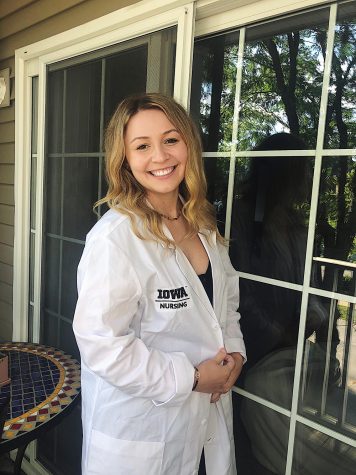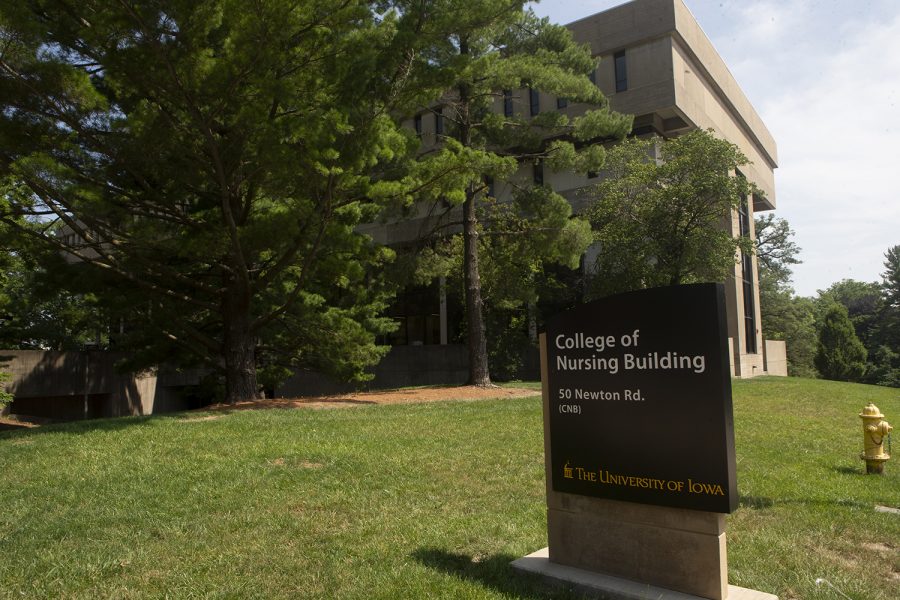University of Iowa nursing students frustrated with virtual white coat ceremony
Nursing students have expressed frustration with the College of Nursing’s decision to host a virtual white coat ceremony after the College of Medicine allowed students to participate in a hybrid delivery.
The College of Nursing Building is seen on Monday, July 8, 2019.
August 25, 2020
Multiple University of Iowa College of Nursing students expressed frustration following the school’s decision to move its annual white-coat ceremony to a virtual format. Despite the decision resulting from efforts to reduce the spread of COVID-19, some nursing students had negative responses.
The College of Nursing hosted its Aug. 21 ceremony one week after the Carver College of Medicine hosted a hybrid white coat ceremony on Aug. 14.
UI junior and nursing student, Cassandra Brown, said the Carver College of Medicine’s hybrid white-coat ceremony is one reason why some students felt animosity toward having a virtual white-coat ceremony.
RELATED: UI reports 111 COVID-19 cases on campus as classes begin
Brown said nursing students were initially led to believe their white coat ceremony would take place in person. When the news came that the ceremony had been moved to a virtual format, Brown said she was understanding of the decision.
That changed when nursing students learned that the medical students were still allowed to have a portion of their ceremony in-person, however, she said.

“We were a little bit confused about why [medical students] were able to have theirs [in-person], but we weren’t able to have ours [in-person],” Brown said.
UI Kelting Dean of the College of Nursing Julie Zerwic said the two colleges have decision-making processes independent of each other, which is why the College of Medicine was able to hold its in person.
Zerwic said the College of Nursing had to hold a virtual white-coat ceremony due to a UI policy prohibiting events greater than 50 people under COVID-19 guidelines.
The College of Medicine worked around this policy to accommodate a hybrid ceremony for its 152 students. This was achieved by hosting the ceremony in separate groups, said College of Medicine Senior Associate Dean for Medical Education Christopher Cooper.
“We wanted to have some element of something live,” Cooper said of the decision to hold a hybrid ceremony.
Zerwic explained that the College of Nursing placed a focus on education and inclusion, contributing to the decision to avoid the in-person small groups that the College of Medicine opted for.
“We made a decision very early on that the focus of our in-person activities needed to be on clinical experiences and lab experiences,” Zerwic said.
Cooper said the virtual aspect of the College of Medicine’s white coat ceremony was well received, with a higher number of guests watching remotely than usually in attendance.
“One of the take-home points is that, if possible, we may continue to live stream this in the future,” Cooper said.
It is anticipated that nursing students will become strongly engaged and have an enhanced learning experience this semester, Zerwic said. Due to policies and restrictions, she said students in clinicals will work with faculty in smaller groups with more opportunities for one-on-one interaction.
“[Students in clinicals] will have so much more attention from a faculty member than what they would usually experience,” Zerwic said.
Zerwic said that she sympathized with the attitudes of disappointed nursing students.
“They have every right to feel frustrated,” Zerwic said. “But I think we are trying to balance a lot of competing kinds of educational issues and trying to make sure the decisions we make are in their best interest.”
Reflecting on last week’s virtual white-coat ceremony, Brown said she understands the school’s decision to host a virtual ceremony.
“I think it was a valid reason,” she said. “Especially looking back on it now that three [nursing students] have tested positive for COVID.”






